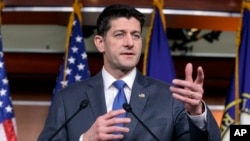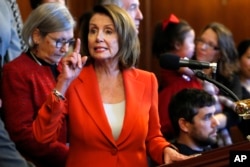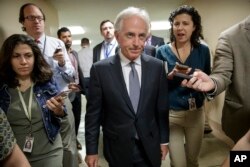President Donald Trump’s decision to pull the United States out of the Iran nuclear agreement has revived the bitter partisan debate that greeted the deal on Capitol Hill 21/2 years ago.
Democrats said the move was the first step toward isolating the United States in the world diplomatic community, while Republicans praised the decision as an overdue end to one of President Barack Obama’s signature foreign policy efforts.
“From the beginning, the Obama-era Iran Deal was deeply flawed. Iran’s hostile actions since its signing have only reaffirmed that,” Republican Speaker of the House Paul Ryan said of the announcement.
Ryan said he has always believed the best course of action would be to fix deficiencies in the agreement and that it was “unfortunate that we could not reach an understanding with our European partners on a way to do that.”
But House Democratic Leader Nancy Pelosi said Trump’s “rash decision isolates America, not Iran.” Democrats say the President is creating a crisis by ignoring the reality that the nuclear deal is working by keeping Iran from constructing a nuclear bomb.
House Democrats said the deal eliminated the United States’ negotiating power to address the regime’s human rights abuses and support of terrorist organizations.
“It could pave the way for Iran to resume its work towards the nuclear weapon, which of course puts us on the path to war with Iran and it ends our rigorous inspection and verification regime,” Rep. Barbara Lee, a Democrat from California, told reporters in a conference call shortly after the announcement. “It will put our allies in an impossible situation, it will make the United States even more of a pariah on the world’s stage.”
In 2015, the Joint Comprehensive Plan of Action (JCPOA) eventually cleared both chambers of the U.S. Congress after a closely fought battle on Capitol Hill to avoid a resolution of disapproval.
Some Republican members of Congress have acknowledged the limitations of the deal in the past while expressing their support.
“As flawed as the deal is, I believe we must now enforce the hell out of it,” House Foreign Affairs Chairman Rep. Ed Royce said at an October House Foreign Affairs Committee hearing.
Many Republicans see the Trump administration decision as an opportunity to start fresh in the U.S. approach to Iran.
“While I support the end of this terrible deal and taking a stronger approach to dealing with Iran, I urge the president and his administration to deliver a comprehensive plan that will hold Iran accountable, protect our national security, and firmly restrict Iran’s ballistic missile weapons and nuclear program,” Rep. Adam Kinzinger, a Republican on the House Foreign Affairs Committee, said in a statement.
Senate reaction
On the Senate side of the Capitol, the Republican Chairman of the Foreign Affairs Committee, Bob Corker, had a seemingly more moderate reaction. Corker said he is “disappointed” the U.S. and its allies could not agree on how to remedy the provision in the deal that lets Iran eventually step up its uranium enrichment program. He said he believes the Trump administration distraction will move quickly toward a better deal and said he will work with U.S. allies toward that goal.
But the committee’s top Democrat, Sen. Bob Menendez, said backing out of the agreement will only isolate the United States and give Russia, China and Iran the opportunity to continue major weapons sales and challenge the U.S. and Europe.
Republican Sen. Jim Inhofe said the president is “countering, not appeasing the regime in Tehran.”
In an interview with Alhurra television, Democratic Sen. Tom Udall said he worries about “hostile voices” in the Trump administration that seem to be pushing “closer to war with Iran.”
“President Trump has stepped away from an agreement we know was working, it was preventing them from obtaining nuclear weapons,” he said. “That’s going to hurt our standing in the world.”






